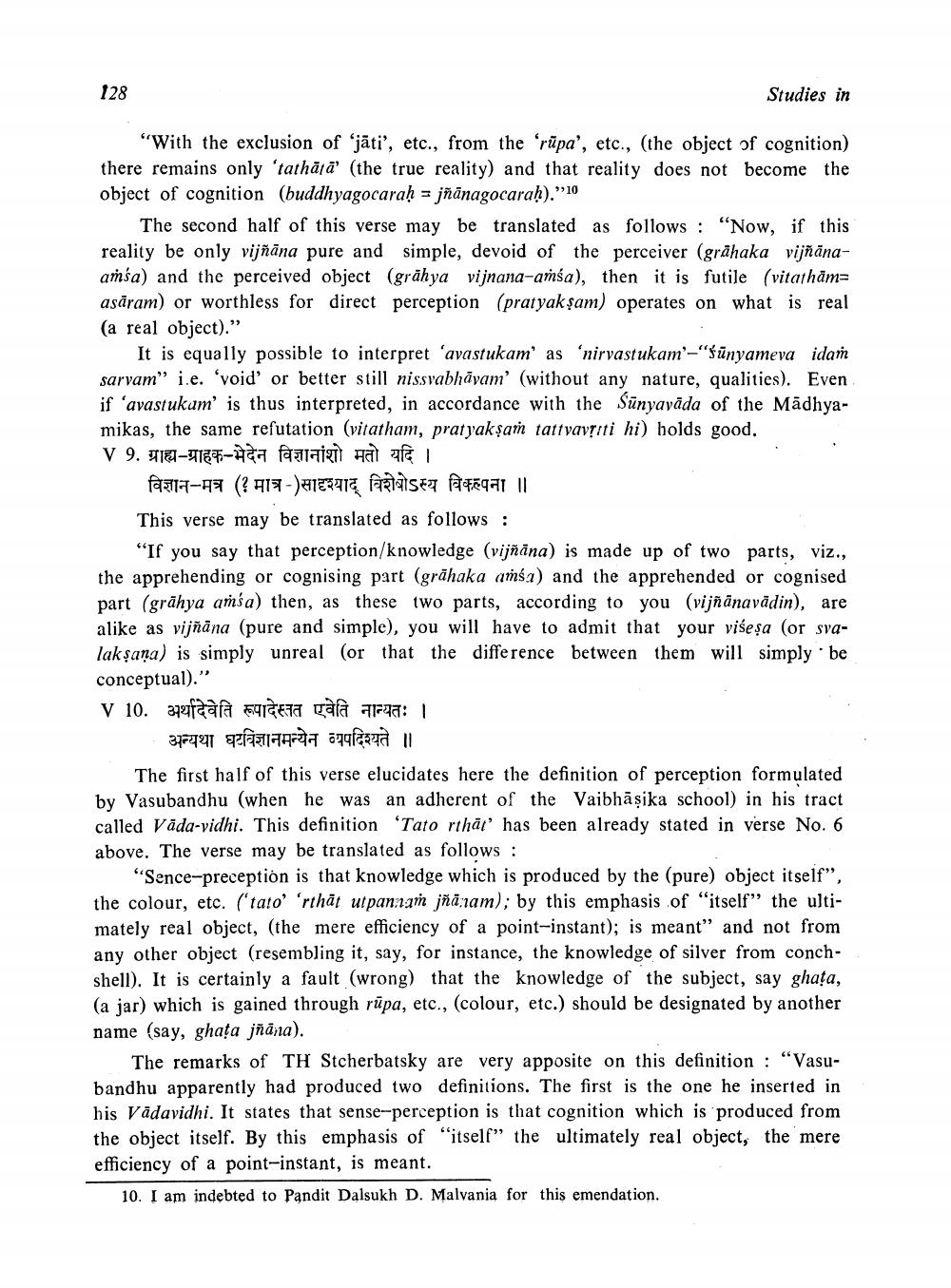________________
128
"With the exclusion of 'jäti', etc., from the 'ripa', etc., (the object of cognition) there remains only 'tathata' (the true reality) and that reality does not become the object of cognition (buddhyagocarab jñānagocarab)."
Studies in
The second half of this verse may be translated as follows: "Now, if this reality be only vijñāna pure and simple, devoid of the perceiver (grähaka vijñānaamia) and the perceived object (grahya vijnana-amsa), then it is futile (vitarhäm= asaram) or worthless for direct perception (pratyakşam) operates on what is real (a real object)."
It is equally possible to interpret 'avastukam' as 'nirvastukam"-"ünyameva idam sarvam" i.e. 'void' or better still nissrabhavam' (without any nature, qualities). Even if 'avastukam' is thus interpreted, in accordance with the Sünyavada of the Madhyamikas, the same refutation (vitatham, pratyakşam tattvavṛnti hi) holds good, V 9. ग्राह्यग्राहक भेदेन विज्ञानांश मतो यदि ।
विज्ञान - मंत्र ( १ मात्र ) सादवाद विशेषोऽस्य विपना ॥
-
This verse may be translated as follows :
"If you say that perception/knowledge (vijñāna) is made up of two parts, viz., the apprehending or cognising part (grāhaka amsa) and the apprehended or cognised part (grahya amia) then, as these two parts, according to you (vijñānavādin), are alike as vijñāna (pure and simple), you will have to admit that your višesa (or svalakṣaṇa) is simply unreal (or that the difference between them will simply be conceptual)."
V 10 अर्थादेवेति रूपादेस्तत एवेति नान्यतः |
अन्यथा पटविज्ञानमन्येन व्यपदिश्यते ॥
The first half of this verse elucidates here the definition of perception formulated by Vasubandhu (when he was an adherent of the Vaibhāṣika school) in his tract called Vada-vidhi. This definition 'Tato rthat has been already stated in verse No. 6 above. The verse may be translated as follows :
"Sence-preception is that knowledge which is produced by the (pure) object itself", the colour, etc. ('tato' 'rthat utpannam jhanam); by this emphasis of "itself" the ultimately real object, (the mere efficiency of a point-instant); is meant" and not from any other object (resembling it, say, for instance, the knowledge of silver from conchshell). It is certainly a fault (wrong) that the knowledge of the subject, say ghata, (a jar) which is gained through rupa, etc., (colour, etc.) should be designated by another name (say, ghața jñāna).
The remarks of TH Stcherbatsky are very apposite on this definition: "Vasubandhu apparently had produced two definitions. The first is the one he inserted in his Vädavidhi. It states that sense-perception is that cognition which is produced from the object itself. By this emphasis of "itself" the ultimately real object, the mere efficiency of a point-instant, is meant..
10. I am indebted to Pandit Dalsukh D. Malvania for this emendation.




